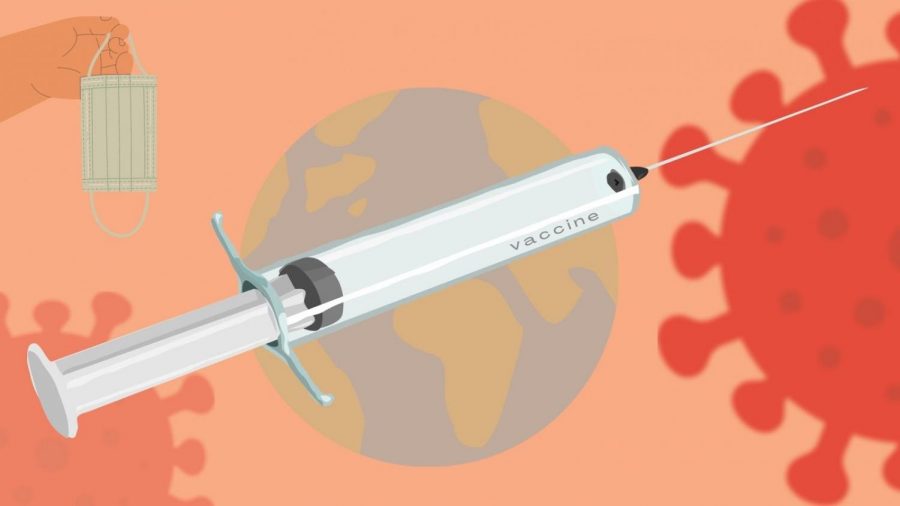It’s Time to Trust the Science
Debunking Vaccine Myths
Should you get the COVID-19 vaccine? Science points to yes.
March 5, 2021
In The Forest Scout’s most recent poll, 23% of participants said that they are not planning on getting the COVID-19 vaccine.
This percentage is surprisingly high after the events of this past year: a year completely thrown off the rails, plagued with a virus that not only disrupted academics, businesses, and social lives worldwide, but killed over two million people.
There are some comprehensible explanations as to why people are reluctant to receive the vaccine. It is understandable why people of color are wary about receiving the vaccine due to distrust in the healthcare system in America, which has a long history of racism.
However, many choosing not to receive a vaccine when they are eligible for it—and even boasting about it—are making their decision based on unfounded claims. The internet has made it incredibly easy for baseless theories to reach more people. Misinformation constantly gets spread through news sites, social media, and various organizations, including ones made up of anti-vaccine activists or “anti-vaxxers,” in hopes of painting a false narrative about the vaccine.
As a result, many, including students from LFHS, are making their decision not to receive the vaccine based on unsubstantiated claims:
“The vaccine is dangerous because its development and testing were rushed.”
A rapid development does not mean steps were skipped or protocols were glossed over. The impact that COVID-19 made on the world warranted an immediate emergency response from vaccine developers. Billions of dollars and resources were invested into the quick development of a vaccine. Not only this, but the methods used for the creation of the Pfizer/BioNTech and Moderna vaccines have been in development for years, and the use of messenger RNA (mRNA) allows for faster development than traditional vaccines.
After the distribution of 245 million doses around the world over a span of 2 months, the vaccine has been shown to be both effective and safe, with no serious side effects.
“There are extreme/severe side effects to the vaccine.”
The only side-effects that have occurred have been mild to moderate short-term reactions that resolve with no complications. Short-term side effects might include headache, chills, fatigue, muscle pain, soreness around the injection site, or fever lasting for one to two days.
This is common when receiving any vaccine, and is an indication that the body is responding to the vaccine.
The COVID-19 vaccines have not been linked to infertility either. A false report claiming that the vaccines produce antibodies that bind to placental proteins and prevent pregnancy has circulated online. This claim is not scientifically plausible; there is no reason to believe that the vaccines will negatively affect fertility or pregnancy.
“The COVID-19 vaccine will have dangerous long-term side-effects.”
This might be a valid concern, as Pfizer and Moderna vaccine clinical trials only began in the summer of 2020 so it is not clear what the long-term effects will be. However, history shows and the evidence is strong that the vaccines will not cause long-term harm. There has not been a serious side effect to a vaccine in history that hasn’t occurred within 8 weeks of receiving the dose.
Additionally, the vaccine is not made with the virus, but rather mRNA, so the vaccine will not give someone COVID, like what can occur when someone receives a flu vaccine.
The vaccine will also have no long-term (or short-term) effect on your DNA, as the mRNA will not alter it. Once the cells finish using the mRNA instructions, your body will break it down and get rid of it.
“I don’t need a vaccine because I already got COVID and recovered. It isn’t that bad.”
Currently, there is not enough information available to determine how long people benefit from natural immunity after contracting and recovering from COVID-19. Re-infection is possible as well. Those who have been sick from COVID-19 will benefit from receiving the vaccine, and some scientists believe that it is more effective than any stage of natural immunity.
Vaccines are not developed simply for a “mild sickness” where the worst it could get is a stuffed-up nose and a headache. COVID has caused damage to the heart, lungs, and brain. It has left people—even those with mild cases—with long-lasting symptoms and complications.
COVID-19 has killed over and over again.
Amid all the widespread false claims, it is essential to recognize that the vaccine will protect not only you from COVID but others as well, who may be more vulnerable to becoming seriously ill or dying from it.
Receiving the vaccine will contribute to herd immunity, which is essential to putting a stop to the virus. Reaching herd immunity will subsequently slow the spread and replication of the virus, stopping it from mutating, and vaccines will be even more effective.
Long story short, vaccines save lives. It’s time to trust the science, not the fear-mongering and misinformation in the media.
“What we see is that immunity conferred by the vaccine can essentially completely limit the breakout of any infections in the population,” Galit Alter, professor of medicine at Harvard Medical School and the Ragon Institute of MGH, MIT, and Harvard, said.
“These data give us hope that even with the vaccines that do not confer 95 percent protection against these emerging variants, the light at the end of the tunnel is approaching.”








Not an anti-vaxxer • Mar 5, 2021 at 5:09 pm
What on earth is wrong with you? Going after your peers and judging them for a personal decision? It makes no sense for a healthy young person to have unknown chemicals injected into their body when they are not at risk for coronavirus. Stop judging people, you have no idea about people’s experiences with vaccines and medicine in the past